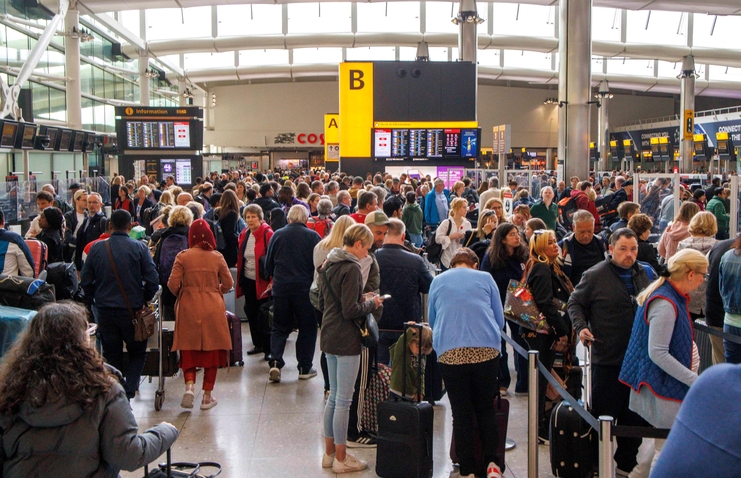Last week staff shortages across multiple British airports caused havoc as thousands sought to jet off for much anticipated half-term holidays.
According to data firm Cirium, an estimated 750 flights due to leave the UK were cancelled while 466 return flights were scrapped.
A senior source at London Gatwick, the UK’s second busiest airport, told The Times that it continues to experience a “meltdown every night” due to air traffic control staff shortages.
As airlines continue to scrap swathes of flights, Heathrow and Stansted baggage handlers, check-in staff and ground staff say they could take strike action over pay and conditions over the summer.


While Brits continue to undergo the financial and logistical chaos of flight cancellations, delays, and all things in between, we ask what the cause of the issues might be, and explore how they might be remedied.
What is causing the issues?
During the UK’s membership of the European Union, it was subject to freedom of movement rules which allowed citizens of any EU member state to live and work in any other member state. This meant that many EU citizens travelled to the UK for labour purposes.
Fresh statistics from the Office for National Statistics (ONS) show that EU immigration to the UK fell as the end of this policy approached, falling from 249,000 in 2016 to 198,000 in 2019.
However non-EU migration has surged from 298,000 to 406,000, while net EU migration continued to be positive until the pandemic struck in early 2020.
It is estimated that the post-Brexit points-based immigration system has opened up half of British jobs to foreign workers. Where once employers had to “prove” a British worker could not be recruited in order to approach an overseas applicant, the new system has lowered salary and skill thresholds for immigrant workers while scrapping the former requirement.
Caps on most visa routes were also scrapped.
This suggests that post-Brexit immigration rules are not the main reason for staffing shortages, with Covid predictably featuring as a key factor.
While the issue is not just a British one, with recent Eurocontrol data demonstrating that cross-European flight delays had reached almost 100,000 minutes in the week to 4 June, the House of Commons travel select committee has said that the UK’s traffic light system of travel restrictions was particularly “disproportionate, confusing and damaging” to its aviation sector particular.
Grant Shapps has blamed the aviation industry for laying off too many staff while Covid restrictions were in place and failing to fortify themselves for a predictable post-pandemic surge. He argues that firms did not adequately funnel government aid toward job protections.
Sue Davies head of consumer rights at Which?, told the BEIS select committee today that the escalation of the issue was down to a lack of compliance with “passenger rights and enforcement of consumer rights.”
She said Which? feel that this has “created a culture within the industry where it’s acceptable to treat consumers so poorly,” referring to examples of people arriving at airports to be faced with multiple delays and cancellations, and being forced to sleep on the floor of terminals.
She stressed that even where “there appear to be quite blatant breaches of the law, it can be very difficult to see how the CAA [Civil Aviation Authority] is investigating.”
Travel journalist Simon Calder’s remarks also seemed to chime with Davies’ telling the committee that while some airlines were dealing with issues more smoothly than others, there were situations where: “something is going very, very badly wrong with the communication process.”
What are the solutions?
London mayor Sadiq Khan, who complains that Brexit is the root of the issue, says a relaxation of visa rules for EU citizens could help recruitment to strengthen the aviation industry ahead of the summer surge.
Over the weekend the Telegraph reported that transport secretary Grant Shapps was discussing plans to roll out temporary work visas to plug gaps in baggage handlers and check-in staffing.
Such permits have previously been released for fruit pickers and musicians.
However, a spokesperson for the department has denied that these talks took place.
Chief executive of trade body Airlines UK Tim Alderslade said following government talks: “We want to work collaboratively with ministers to resolve these issues as quickly as possible, in good time for the summer peak.”
Speaking after the same meeting, transport secretary Grant Shapps said that his department has been “crystal clear – run services properly and according to schedule or provide swift, appropriate compensation. We do not want to see a repeat of this over the summer – the first post-COVID-19 summer season – and will be meeting again in the coming weeks to understand the progress that is being made.”
While the government can indeed attempt to clamp down on airlines that fail to adequately communicate with customers, if recruitment drives fail and strikes go ahead, a drop in travel availability is sure to follow.
The threat of strikes, not just in the UK but at Belgian and Spanish airports, could also spell chaos. Moreover, with rising inflation and stagnant growth, air firms will surely avoid pay rises for striking staff at all costs.
While sunnier days mean travel will continue to pick up in the coming weeks, the final week of July following the end of most school terms is the busiest time for UK holidaymakers. It remains to be seen whether the aviation industry will be able to pick itself up from its succession of chaos and scandals by then.












